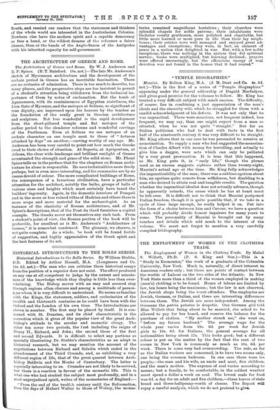"TEMPLE BIOGRAPHIES."
Martini. By Bolton Bing, M.A. (J. M. Dent and Co. 46. ed. net.)—This is the first of a series of "Temple Biographies" appearing under the general editorship of Dugald Macfadien, and gives good promise for the volumes to follow. Mr. King has treated a very difficult subject with much success. The difficulty, of course, lies in combining a just appreciation of the man's ideals and the sincerity with which he struggled for them with a candid acknowledgment of his defects. It was not only that he was impractical. There were occasions, not frequent indeed, less frequent, we may say, than one might expect from a man so situated, when he was not quite "straight." But for an Italian politician who had to deal with facts in the first half of the nineteenth century it was very difficult to be straight. Mr. King allows that in one case he was persuaded to connive at assassination. To supply a man who had suggested the assassina- tion of Charles Albert with money for travelling, and actually to give him a dagger, were acts which can only be palliated by a very great provocation. It is true that this happened, as Mr. King puts it, in "early life," though the phrase used as an excuse suggests eighteen rather than twenty-eight, Mazzini's actual age at the time. Mr. King fully acknowledges the impracticability of the man; there was a sublime egotism about him, an egotism quite remote from selfishness, but disabling to a man who desired to attain real and tangible results. The question whether the impractical idealist does not actually advance, though he apparently retards, the cause which he has at heart must be left over. It is difficult not to think that Mazzini postponed Italian freedom, though it is quite possible that, if we take in a cycle of time large enough, he really helped it on. Pat into the form of a choice between him and Cavour, we have a question which will probably divide honest inquirers for many years to come. The personality of Mazzini is brought out by many touches and details which add much to the interest of the volume. We must not forget to mention a very carefelly compiled bibliography.






















































 Previous page
Previous page